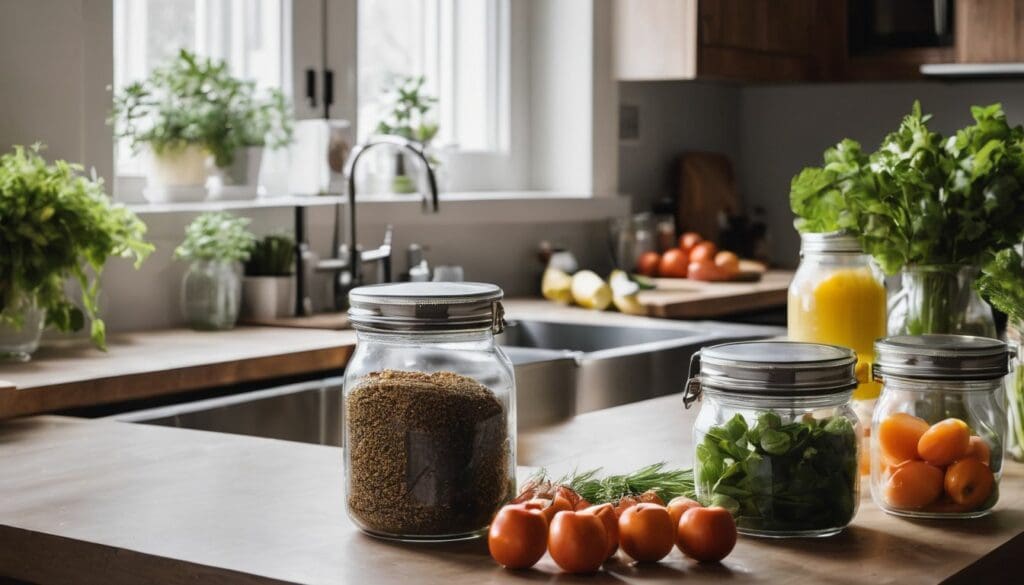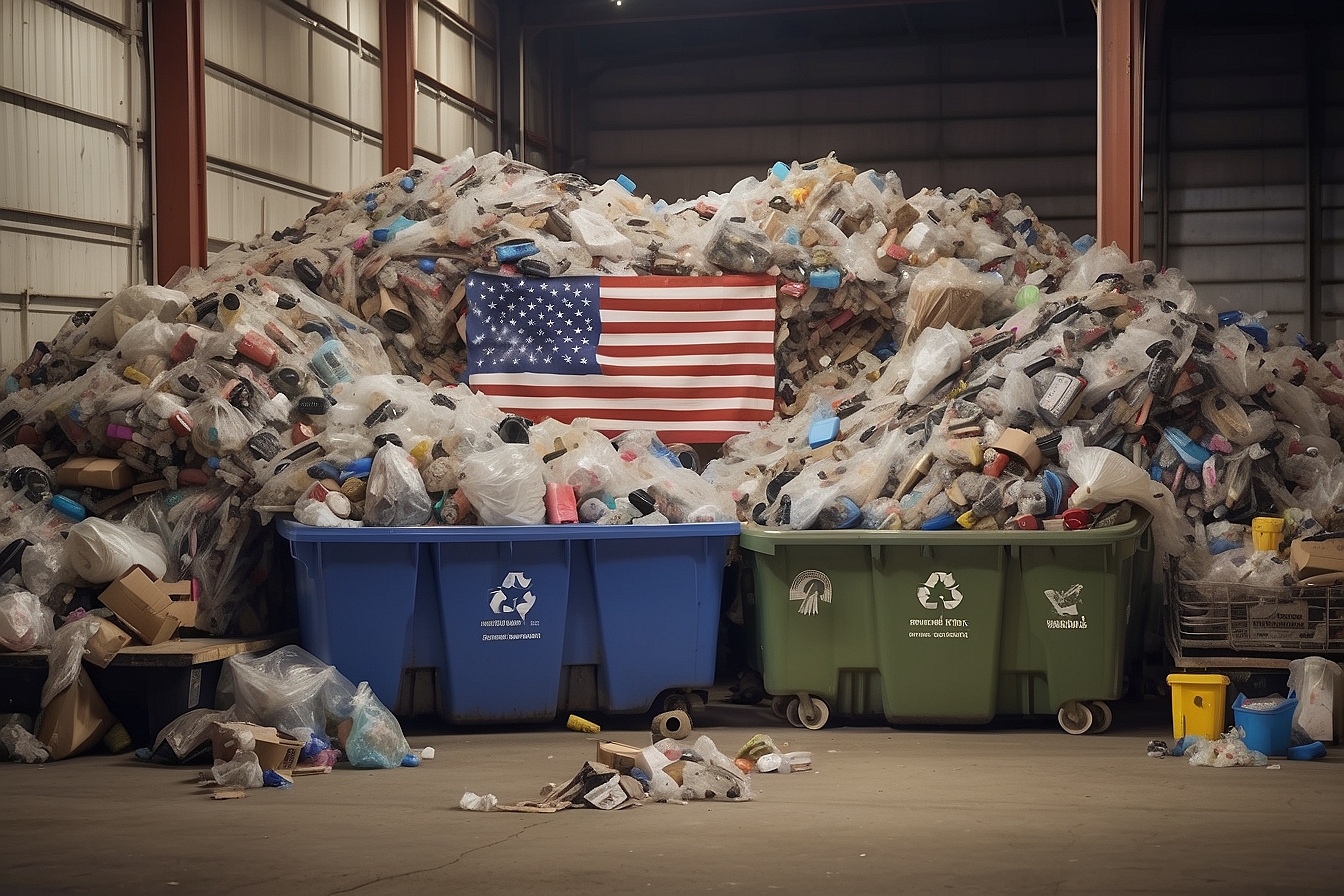Confronting the towering heaps of waste we amass every day can indeed be quite daunting. We’re alongside you, sifting through the detritus that accumulates in our own nooks and crannies, only to find that the average individual contributes more than 2 kilograms of rubbish to this pile each and every day.
Our handbook is brimming with down-to-earth advice, guiding you gently towards embracing a zero-waste lifestyle – all while reducing your ecological footprint, one discarded item at a time.
Join us as we delve into a world where simplicity goes hand in hand with caring for our planet!
Key Takeaways
- Begin your zero waste journey by assessing the sources and amount of waste you produce. Check what’s being thrown out at home, from food scraps to old electronics, and think about how shopping habits contribute to this.
- Adopt the 5 R’s: Refuse items you don’t need, reduce consumption by buying less, reuse products instead of discarding them, recycle properly and compost organic waste like food scraps and garden clippings.
- Make simple daily changes such as refusing single – use plastics and opting for reusable alternatives. Teach yourself sustainable practices and share this knowledge with others in your community to encourage a wider impact.
- Reducing waste isn’t just good for the planet; it can also save money by cutting down on unnecessary purchases. Investing in quality over quantity helps support a minimalist lifestyle that is both cost-effective and environmentally friendly.
- Create a more sustainable future through conscious choices that lower our carbon footprint. Embrace eco-friendly habits collectively to have a greater positive effect on our environment.
Assess Your Waste
To start living a zero waste lifestyle, it’s important to first assess the sources and amount of waste in your everyday life. By identifying ways to reduce waste, you can take small but meaningful steps towards sustainable living.
Identify sources of waste
We all strive to lead a more sustainable life by cutting down on waste. Pinpointing where it all comes from is the first step in our journey towards zero waste.
- Start with your bins. Examine what you’re throwing away each day. Is it food scraps, plastic packaging, or unwanted mail?
- Look at your shopping habits. Are you bringing home excess plastic bags, disposable products, or food that often goes uneaten?
- Analyse your bathroom routine. Shampoo bottles, toothpaste tubes, and single – use razors frequently add to our environmental footprint.
- Go through your wardrobe. Clothes that we no longer wear or that are made of synthetic fibres contribute significantly to landfill waste.
- Check electronic usage. Old phones, batteries and broken appliances pile up over time if not properly recycled.
- Study how you clean your home. Many cleaning products come in single-use plastic containers that can easily be replaced with eco-friendly options.
- Consider DIY options for common items which often have excessive packaging such as snacks, juices or even cosmetics.
Determine the amount of waste
To determine the amount of waste we produce, begin by conducting a waste audit. This involves collecting and categorising all the waste generated in a specific period. Weighing the different categories will provide an accurate picture of our waste output.
Additionally, tracking the amount of waste thrown away each day for a week can help uncover patterns and identify areas where we can make changes to reduce our environmental impact.
Examining our purchasing habits is another effective way to gauge the volume of waste we generate. By reviewing receipts and invoices, we can gain insight into how much packaging material and single-use items enter our home regularly.
Identifying these sources of waste will allow us to target them for reduction through alternative choices or conscious consumption practices.
Evaluate ways to reduce waste
To reduce waste, we can start by embracing the 5 R’s – refuse unnecessary items, reduce consumption, and reuse products. By refusing single-use plastics or opting for products with minimal packaging, we can minimise the amount of waste generated.
Additionally, reducing consumption by buying only what is necessary and reusing items before disposing of them will contribute to a significant reduction in waste.
Composting organic waste and actively recycling materials such as paper, glass, and plastic are also effective ways to decrease the overall amount of waste that ends up in landfills or oceans.
Embrace the 5 R’s
Refuse unnecessary items, reduce consumption, and reuse items whenever possible. Additionally, recycle and compost to minimise waste and educate others on the benefits of a zero-waste lifestyle.
Refuse unnecessary items
When unnecessary items are refused, it significantly reduces the amount of waste generated. By saying no to single-use plastics, excessive packaging, and promotional freebies, we actively contribute to waste reduction.
We can make a conscious effort to choose products with minimal or recyclable packaging and opt for reusable alternatives such as water bottles, shopping bags, and coffee cups. This simple action aligns with our eco-friendly lifestyle and supports sustainable practices.
To refuse unnecessary items also means making mindful decisions as ethical consumers because every choice we make has an impact on the environment. It involves being selective about what enters our lives and homes by prioritising quality over quantity in our purchases.
Reduce consumption
Let’s cut back on unnecessary purchases and reduce our consumption of single-use items. Opt for durable, reusable products instead of disposable ones to minimise waste. Choose to repair or repurpose things before replacing them.
By being mindful of what we buy, we can lessen our environmental impact and move closer towards a zero-waste lifestyle.
Now let’s delve into the next step in our journey towards zero waste – ‘Reuse items’.
Reuse items
After reducing consumption, we can take the next step towards a zero waste lifestyle by reusing items. This helps to minimise our environmental impact and reduce our carbon footprint.
By using durable and reusable products instead of disposable ones, we lessen the amount of waste going to landfills and save energy used in manufacturing new items. Repurposing old containers, repairing clothes and gadgets, or borrowing and sharing equipment are simple yet effective ways to cut down on unnecessary waste.
Moreover, choosing second-hand items not only reduces landfill waste but also supports ethical consumerism by giving products a second life. Embracing this practice encourages sustainability while promoting a more mindful approach towards consumption.
Recycle and compost
After reusing items, the next step is to recycle and compost. This involves sorting waste into recyclable materials like paper, glass, plastic, and metal. These can be taken to a recycling facility or placed in designated recycling bins.
Composting organic waste such as food scraps and yard trimmings helps create nutrient-rich soil for gardening. By incorporating these practices into our daily routine, we contribute to reducing landfill waste and minimising our carbon footprint.
Adopting a lifestyle that prioritises recycling and composting not only benefits the environment but also sets an example for others to follow. It’s important to educate ourselves about local recycling guidelines and seek out opportunities to integrate sustainable habits into everyday life.
Rot/Compost organic waste
To further reduce waste, we can address organic waste by implementing composting practices. Composting involves breaking down organic materials such as food scraps, garden trimmings, and paper into nutrient-rich soil.
By diverting organic waste from landfills and turning it into compost, we can enrich our soil and reduce the production of harmful greenhouse gases. This simple yet effective method aligns with our zero waste goals and contributes to a more sustainable future in line with environmental consciousness.
Implementing composting not only reduces the amount of waste sent to landfills but also provides an opportunity to give back to the environment through creating nourishing soil for gardens and green spaces.
Educate and inspire others about zero waste lifestyle
Embracing a zero waste lifestyle means making conscious choices to reduce, reuse, and recycle. By refusing unnecessary items, reducing consumption, and reusing what we have or composting organic waste, we can significantly minimise our environmental impact.
Educating and inspiring others about zero waste living helps create a ripple effect of positive change in our communities. Encouraging others to embrace eco-conscious habits not only reduces individual carbon footprints but also promotes broader sustainability efforts for a greener future.
Supporting conservation and environmental initiatives can be as simple as sharing practical tips for waste management and minimalism with those around us. As advocates for ethical living and green practices, it’s crucial to communicate the benefits of eco-friendly lifestyles clearly and effectively while embodying these principles in our own actions.
Conclusion
Take small steps to reduce waste daily and make meaningful changes for a sustainable future. Read on to learn practical strategies for embracing a zero waste lifestyle.
Take small steps to reduce waste daily
Reduce waste daily by starting with simple changes. Refuse single-use plastics and opt for reusable alternatives. Sort and recycle household items to minimise landfill waste. Repurpose old clothing, jars, or containers for storage or DIY projects to cut down on unnecessary purchases.
Compost food scraps and yard waste to reduce carbon footprint.
Educate yourself about sustainable living practices and spread awareness within your community. Encourage friends and family to join in small eco-friendly actions like using cloth shopping bags or participating in local recycling programmes.
Make meaningful changes for a sustainable future.
Take action today by refusing single-use plastics and unnecessary packaging. Embrace a minimalist lifestyle, reducing your consumption of goods that generate waste. Reuse items wherever possible, from shopping bags to containers, to minimise the need for new products.
Recycle and compost household waste effectively to reduce your carbon footprint and support environmental conservation. Educate and inspire others about the benefits of a zero-waste lifestyle, promoting eco-friendly habits in your community.
Contribute to a sustainable future by making simple yet impactful changes in daily life. Refusing, reducing, reusing, recycling, and educating others are key steps towards achieving an eco-conscious lifestyle and minimising environmental impact.
FAQs
1. What is a zero waste lifestyle?
A zero waste lifestyle means living in a way that aims to reduce rubbish by reusing and recycling, following eco-friendly strategies for green living.
2. How can someone start practising zero waste habits?
To practise zero waste tactics, begin with simple eco-conscious habits like saying no to single-use plastics and choosing items that you can reuse over time.
3. Can switching to a zero waste lifestyle really lessen my carbon footprint?
Yes, adopting a zero waste approach helps cut down the amount of waste produced and therefore reduces your overall carbon footprint significantly.
4. Is it costly to maintain an eco-friendly lifestyle?
Not necessarily! Living green often saves money as you learn to reuse what you have rather than constantly buying new, reducing the need for excess spending.





